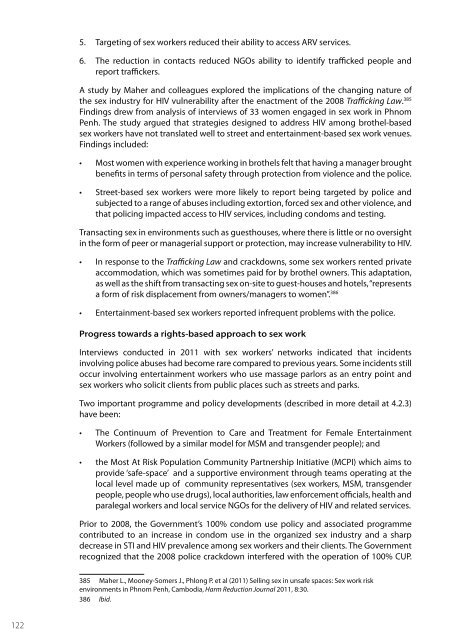SEX WORK AND THE LAW - HIV/AIDS Data Hub
SEX WORK AND THE LAW - HIV/AIDS Data Hub
SEX WORK AND THE LAW - HIV/AIDS Data Hub
Create successful ePaper yourself
Turn your PDF publications into a flip-book with our unique Google optimized e-Paper software.
5. Targeting of sex workers reduced their ability to access ARV services.<br />
6. The reduction in contacts reduced NGOs ability to identify trafficked people and<br />
report traffickers.<br />
A study by Maher and colleagues explored the implications of the changing nature of<br />
the sex industry for <strong>HIV</strong> vulnerability after the enactment of the 2008 Trafficking Law. 385<br />
Findings drew from analysis of interviews of 33 women engaged in sex work in Phnom<br />
Penh. The study argued that strategies designed to address <strong>HIV</strong> among brothel-based<br />
sex workers have not translated well to street and entertainment-based sex work venues.<br />
Findings included:<br />
<br />
<br />
Most women with experience working in brothels felt that having a manager brought<br />
benefits in terms of personal safety through protection from violence and the police.<br />
Street-based sex workers were more likely to report being targeted by police and<br />
subjected to a range of abuses including extortion, forced sex and other violence, and<br />
that policing impacted access to <strong>HIV</strong> services, including condoms and testing.<br />
Transacting sex in environments such as guesthouses, where there is little or no oversight<br />
in the form of peer or managerial support or protection, may increase vulnerability to <strong>HIV</strong>.<br />
<br />
<br />
In response to the Trafficking Law and crackdowns, some sex workers rented private<br />
accommodation, which was sometimes paid for by brothel owners. This adaptation,<br />
as well as the shift from transacting sex on-site to guest-houses and hotels, “represents<br />
a form of risk displacement from owners/managers to women”. 386<br />
Entertainment-based sex workers reported infrequent problems with the police.<br />
Progress towards a rights-based approach to sex work<br />
Interviews conducted in 2011 with sex workers’ networks indicated that incidents<br />
involving police abuses had become rare compared to previous years. Some incidents still<br />
occur involving entertainment workers who use massage parlors as an entry point and<br />
sex workers who solicit clients from public places such as streets and parks.<br />
Two important programme and policy developments (described in more detail at 4.2.3)<br />
have been:<br />
<br />
<br />
The Continuum of Prevention to Care and Treatment for Female Entertainment<br />
Workers (followed by a similar model for MSM and transgender people); and<br />
the Most At Risk Population Community Partnership Initiative (MCPI) which aims to<br />
provide ‘safe-space’ and a supportive environment through teams operating at the<br />
local level made up of community representatives (sex workers, MSM, transgender<br />
people, people who use drugs), local authorities, law enforcement officials, health and<br />
paralegal workers and local service NGOs for the delivery of <strong>HIV</strong> and related services.<br />
Prior to 2008, the Government’s 100% condom use policy and associated programme<br />
contributed to an increase in condom use in the organized sex industry and a sharp<br />
decrease in STI and <strong>HIV</strong> prevalence among sex workers and their clients. The Government<br />
recognized that the 2008 police crackdown interfered with the operation of 100% CUP.<br />
385 Maher L., Mooney-Somers J., Phlong P. et al (2011) Selling sex in unsafe spaces: Sex work risk<br />
environments in Phnom Penh, Cambodia, Harm Reduction Journal 2011, 8:30.<br />
386 Ibid.<br />
122
















